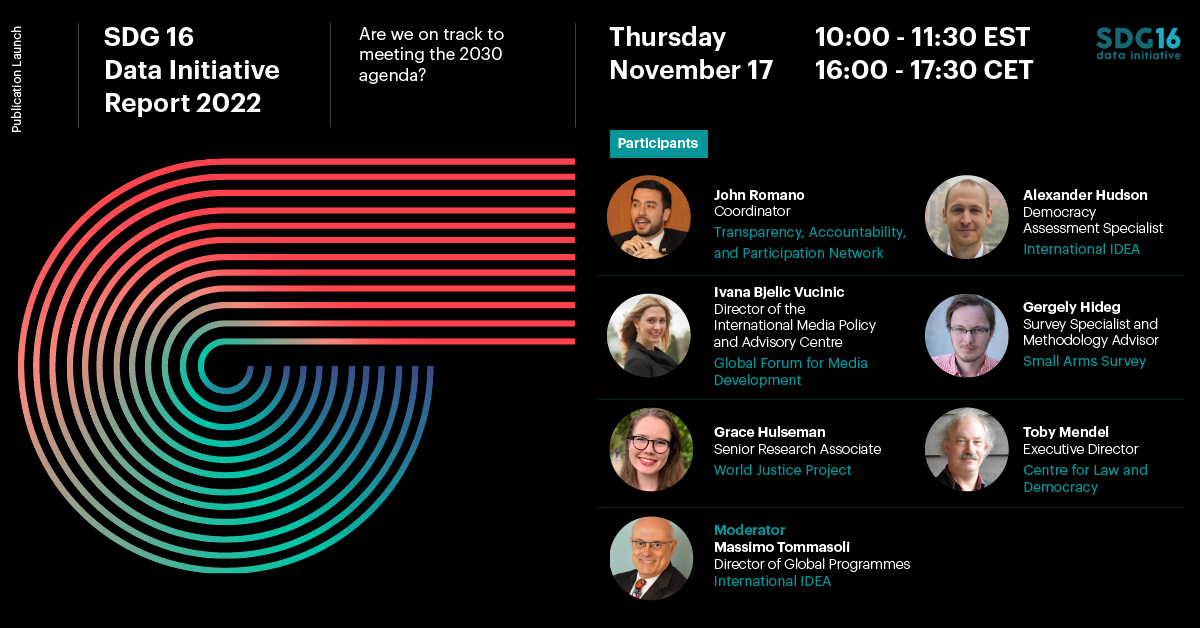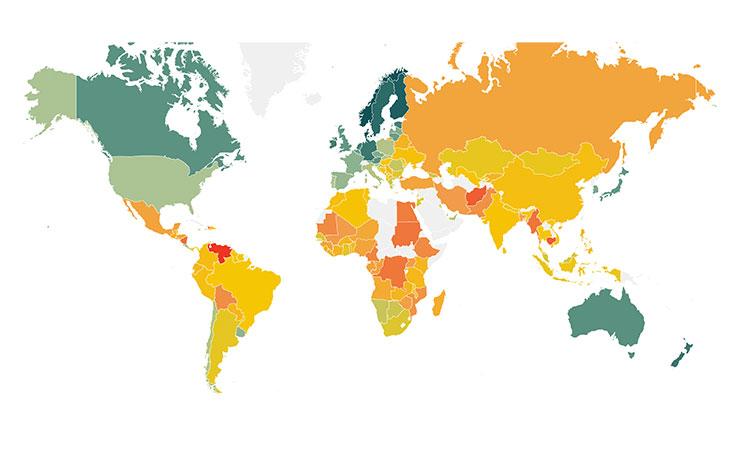

Earlier this year, the World Justice Project (WJP) convened the World Justice Forum in The Hague, bringing together more than 1,000 participants representing 116 countries. Access to justice was one of the three central themes, and the Final Statement on Building More Just Communities calls on governments to collaborate with civil society actors and others to collect, analyze, use, and report people-centered data to understand justice problems and assess progress towards the goal of justice for all.
This call to action is critically important as the global community looks ahead to a new year, particularly one which will mark the halfway point of the 2030 Agenda for Sustainable Development. Enacted by the UN in 2015, the 2030 Agenda consists of 17 Sustainable Development Goals (SDGs) that are designed to galvanize concrete development action around the world. The 17 goals cover a number of themes, including eliminating poverty, advancing gender equity, and protecting the environment. The WJP’s work aligns with Goal 16:
Goal 16: “Promote peaceful and inclusive societies for sustainable development, provide access to justice for all and build effective, accountable and inclusive institutions at all levels.”
As part of the WJP’s work engaging with the broader justice community, the organization participates in the SDG 16 Data Initiative, a collaborative effort between the WJP and other organizations committed to leveraging their relevant expertise to track progress on Goal 16. On November 17, the SDG 16 Data Initiative will host a launch event for their annual report.
The 2022 Report, “Are we on track to meeting the 2030 Agenda?”, offers a multi-faceted and nuanced picture of what progress has been made thus far on Goal 16, and what the road ahead may look like. Fulfilling the promise of Goal 16 is important in and of itself: the achievement of global peace, justice, and inclusion is valuable. Furthermore, the achievement of Goal 16 is intertwined with the rest of the 2030 Agenda, as highlighted in the report’s discussion of interlinkages.
In Chapter 3, WJP Senior Research Associate Grace Hulseman takes stock of Goal 16.3 specifically. Goal 16.3 calls for the promotion of the rule of law and equal access to justice for all at the national and international levels. Analysis of the three official indicators suggests that the global community is falling short of Goal 16.3. Data from the World Justice Project Rule of Law Index® 2021 reinforces this: comparison of regional trends in Factor 7: Civil Justice and Factor 8: Criminal Justice between 2015 and 2021 indicates global stagnation.
Furthermore, the chapter highlights a critical barrier to assessing progress on Goal 16.3: an overall dearth of data. The UN Department of Economic and Social Affairs hosts the SDG Indicators Database, a valuable data resource for the 2030 Agenda. However, not many countries regularly report data on the Goal 16.3 indicators, making it very challenging to assess where countries stand relative to the Goal 16.3 objective. While nearly all countries have reported data on Indicator 16.3.2—the proportion of unsentenced detainees—at least once between 2000 and 2020, fewer than half (88 countries) reported data in 2020. Data coverage on Indicator 16.3.1—police reporting rates for physical assault, sexual assault, and robbery—is much worse, with only a handful of countries reporting data in 2020. Indicator 16.3.3 is the newest of bunch and the SDG Indicators Database does not yet include any data. The limited data coverage for the Goal 16.3 indicators underscores the findings of Grasping the Justice Gap, which identified understanding the scope, nature, and impact of justice problems a core data priority for strengthening people-centered justice.
The lack of data clouds any understanding of what progress has been made towards ensuring the rule of law and access to justice. In the interim, unofficial data sources, such as the WJP’s Rule of Law Index and Global Insights on Access to Justice offer critically important insights into the status of the rule of law and access to justice globally. Resources such as the Atlas of Legal Needs Surveys serve as informative knowledge products for justice actors and decisionmakers who are interested in better understanding the state of Goal 16.3 in a given context.
2023 will be a critically important year for justice. The 2023 High Level Political Forum marks the half-way point to 2030, a stark reminder of the tall ambitions of the 2030 Agenda and the work still necessary for fulfilling it. The SDG 16 Data Initiative’s Global Report identifies key data points for justice actors to consider, as well as recommendations for moving forward.
Justice for all requires action by all. Learn more about the global status of Goal 16 by reading the full report and joining the launch event on November 17.






